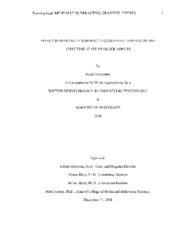Effect of Mentally Subtracting Grateful Events on the Affective State of Older Adults
Abstract
Depression among older adults is increasing, thus, addressing negative affect is relevant to the care of geriatric individuals. As part of lifespan development, older adults reflect on life events, leading to feelings of integrity or despair. The present study compared the affective state of 177 older adults that either (a) reflected on the absence of an event, (b) reflected on the presence of event; and (c) a control group that did not participate in reflection. All participants rated 13 affective states that were summarized as a positive affective state index after reverse scoring for the negative items. The analytic procedure compared the index means across the three conditions. Post hoc comparisons using the Tukey HSD test indicated the mean score for the absence condition (M = 5.853, SD = .762) was significantly different than the control condition (M = 5.323, SD = 0.922) and marginally different than the presence condition (M = 5.489, SD = 0.853). The difference between the presence and control conditions did not reach significance; however, a trend was apparent (M = 5.489, SD = 0.853). The one-way analysis of variance compared indices across conditions and demonstrated a significant main effect of condition at the .05 level, F(2, 174) = 5.976, p = .003. The results suggest when older adults reflect on how grateful events might never have happened, they report more positive feelings than reflecting on how grateful events were sure to happen.
Original item type
PDF
Original extent
84 pages
Collections
Copyright
This original work is protected by copyright. Copyright is retained by the author(s). Works may be viewed, downloaded, or printed, but not reproduced or distributed without author(s) permission.


 Maintained by the Northwest University Library
Maintained by the Northwest University Library